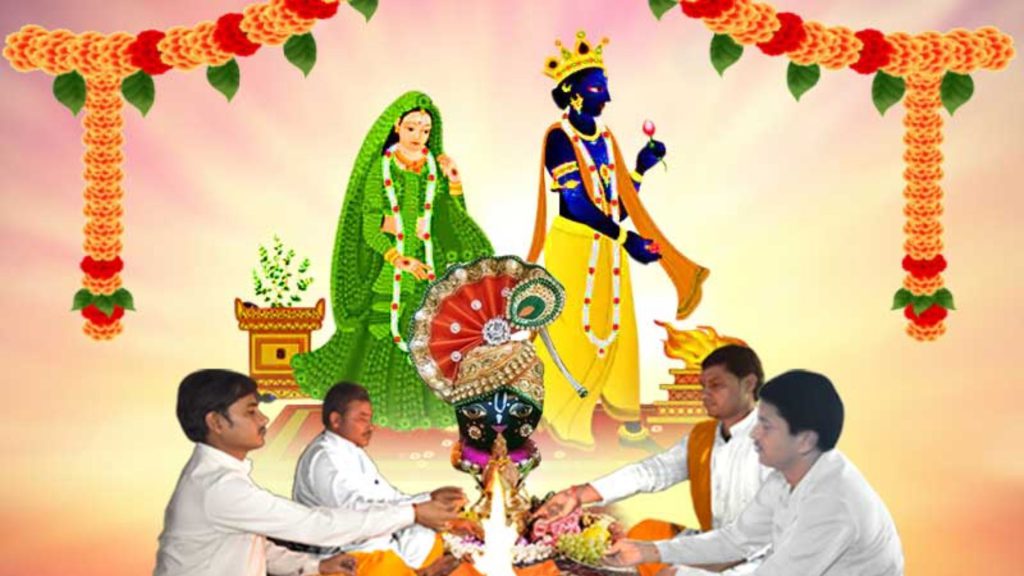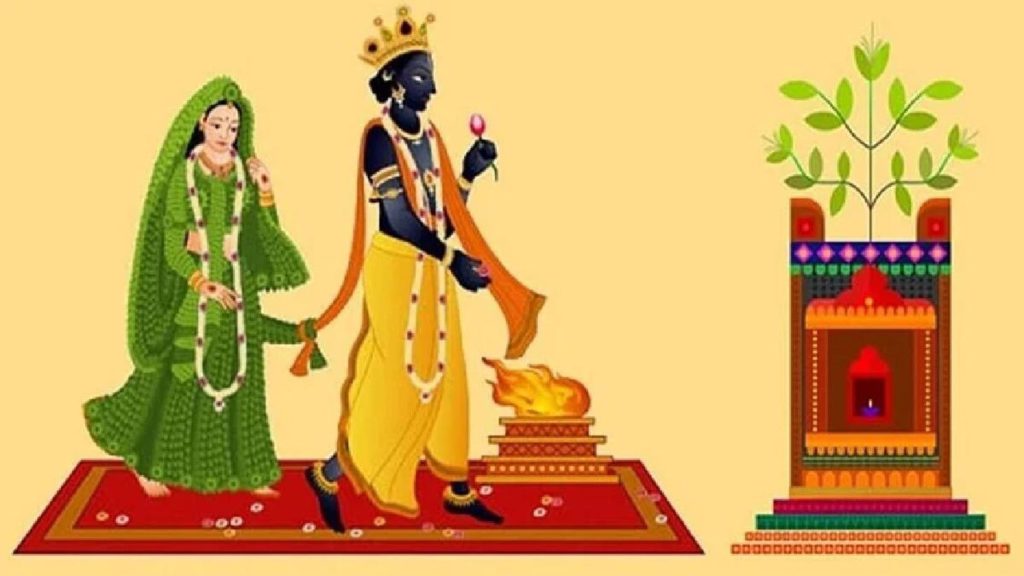Tulsi Vivah 2024: Date, Puja Vidhi, Mantra, Samagri & Significance
In the vibrant tapestry of Hindu festivals, Tulsi Vivah stands as a celebration that beautifully intertwines the realms of nature and spirituality. This blog explores its significance and application in modern times.

Tulsi Vivah 2024: In the vibrant tapestry of Hindu festivals, Tulsi Vivah 2024 stands as a celebration that beautifully intertwines the realms of nature and spirituality. This sacred festival commemorates the ceremonial marriage of the holy basil plant, known as Tulsi, to the “shaligram” form of Lord Vishnu or Lord Krishna, emphasising the deep reverence and love that Hindus hold for the natural world and the divine.
Virtual Puja Experience,
Anytime, Anywhere.
Book Your Puja Now & Ensure A Spiritual Experience For You & Your Loved Ones.
The ritual is performed on the Ekadashi day (11th day) of the bright fortnight of Kartik month in the Hindu calendar, which usually falls in October or November.The preparations of Tulsi Vivah start in advance. Wherein, devotees religiously begin to clean and take good care of the Tulsi plant.
The Legend of Tulsi Vivah
In Hindu mythology, Tulsi is acknowledged as an ardent devotee and lover of Lord Krishna. The celebration of Tulsi and Krishna’s union is marked with fervour, signifying the onset of the wedding season in Hindu customs.
The legend surrounding Tulsi Vivah varies, with a common narrative portraying Tulsi as a woman named Vrinda, married to the demon Jalandhar. Due to her unwavering devotion and chastity, Jalandhar gained invincibility, causing concern among the gods. To address this, Lord Vishnu assumed the guise of Jalandhar and deceived Vrinda. Upon discovering the truth, she cursed Vishnu to transform into a stone (Shaligram) and herself into the Tulsi plant.
In an effort to redeem, Vishnu pledged to marry Vrinda in her subsequent life as Tulsi. Consequently, the marriage ceremony of Tulsi and Vishnu, known as Tulsi Vivah 2024, is observed with prayers and rituals by Hindus.
Isn’t it fascinating how this tradition weaves together elements of mythology, tradition, and nature?
This legend is indeed a poignant reminder of the transformative power of devotion and the capacity for nature to harbour spiritual significance.Further, this story beautifully underscores the sanctity and significance of the Tulsi plant in Hindu culture.
Tulsi Vivah 2024 Date and Time
This year, Tulsi Vivah 2024 is being celebrated on the Ekadashi (eleventh day) of the Kartik month, i.e, November 13th, 2024 according to the Hindu lunar calendar.
On this day, devotees perform a ceremonial marriage between the Tulsi plant and an idol or image of Lord Vishnu. The rituals are intricate and symbolic, and they vary from region to region, adding richness to the festival’s celebrations.
| Festival | Tulsi Vivah 2024 |
| Tulsi Vivah 2024 Date | 13th November 2024 |
| Tulsi Vivah Dwadashi Tithi Beginning Time | 04:04 PM on Nov 12, 2024 |
| Tulsi Vivah Dwadashi Tithi Ending Time | 01:01 PM on Nov 13, 2024 |

The preparations for Tulsi Vivah 2024 begin several days in advance. Devotees thoroughly clean and decorate the Tulsi plant, often placing it under a specially constructed canopy or mandap. The ceremony involves making offerings to the Tulsi plant, singing bhajans (devotional songs), and lighting lamps around it. The wedding ceremony is a sight to behold, with the Shaligram form of Lord Vishnu and the Tulsi plant beautifully adorned, symbolising the divine union.
Significance of Tulsi Plant/Holy Basil in Hinduism
Tulsi, also known as holy basil, is not just a sacred plant. It is also revered as the queen of herbs in Hindu culture. Its significance extends beyond its religious importance.
- The Tulsi plant is believed to have numerous health benefits and is used extensively in Ayurveda, the traditional system of Indian medicine.
- In Hinduism, Tulsi is considered a symbol of purity and devotion. It is said to have protective qualities, and its presence in the home is believed to ward off negative energies. Many households have a dedicated Tulsi plant in their courtyards or gardens, and it is meticulously cared for as a revered member of the family.
- Tulsi is associated with divine energy and is often placed on altars in homes and temples.
- Water infused with Tulsi leaves is considered sacred and used in various rituals. Its leaves are also used in religious ceremonies, including pujas (prayer rituals) and offerings to deities.
Significance of Tulsi Vivah 2024 for Mankind
1. Marital Bliss and Birth of Girl Child
In households where the anticipation for the birth of a girl has persisted for years, observing the Tulsi Vivah 2024 is deemed essential. This ceremonial practice is thought to herald the arrival of a girl in the family, seen as a direct embodiment of Goddess Lakshmi, showering prosperity and blessings upon the household.
Participating in the Tulsi Vivah 2024 festivities, the birth of a girl not only brings joy but is also believed to shower enduring happiness in marital life. Furthermore, for individuals experiencing delays in marriage, taking part in the Tulsi Vivah 2024 ceremony on Kartik Shukla Devutthan Ekadashi is considered auspicious, expediting the matrimonial festivities.
2. Harmonizing Nature and Spirituality
Tulsi Vivah beautifully encapsulates the connection between nature and spirituality. It emphasises the importance of respecting and nurturing the environment while fostering a deeper spiritual connection with the divine. The Tulsi plant, a creation of nature, becomes a vehicle for expressing devotion and love for the divine.
The marriage of Tulsi with the Shaligram form of Lord Vishnu symbolises the intertwining of the physical and spiritual worlds. It showcases the idea that nature itself is divine and that the natural world can be a conduit for spiritual experiences. Tulsi Vivah ritual encourages us to recognize the sacredness in everyday elements of our lives, like a simple plant, and how they can inspire profound spiritual devotion.
3. Cultural Diversity
Another fascinating aspect of Tulsi Vivah 2024 is the cultural diversity in the way it’s celebrated across different regions of India. The festival showcases the vibrancy and uniqueness of Indian culture.
In some places, Tulsi Vivah is observed over a period of five days, with elaborate ceremonies and cultural performances. In other regions, it’s a one-day affair, marked by the marriage ceremony and feasting. The diversity in the way Tulsi Vivah 2024 is celebrated underscores the richness of Indian traditions and the ability to adapt religious rituals to local customs and beliefs.
For example, in Maharashtra, this festival coincides with the harvest festival of ‘Dev Diwali.’ The day is celebrated with lighting lamps, worshipping deities, and offering gratitude for the year’s harvest. In some parts of North India, the focus is on the ceremonial wedding of the Tulsi plant. Thus, the variations highlight the flexibility and adaptability of Hindu customs, making Tulsi Vivah an all-encompassing and diverse celebration.
Tulsi Vivah 2024 Puja Vidhi
Here’s how the Tulsi Vivah puja is typically conducted:
Preparation:
- Selecting the Tulsi Plant: A Tulsi plant, which is often grown in a sacred spot in the home or temple, is beautifully decorated for the wedding ceremony. This includes adorning it with flowers, garlands, and traditional ornaments.
Samagri (Items required): Here’s a list of essential items and some mantras typically used in the Tulsi Vivah puja:
- Tulsi plant, beautifully decorated
- A mandap or wedding altar
- Flowers, garlands, and decorative items
- A lamp and incense sticks
- Cotton thread for tying the knot
- Water, rice, and prasad (sweets or fruits)
- Turmeric paste (haldi)
- Kumkum (vermilion)
- Chandan (sandalwood paste)
- Betel leaves and nuts
- A coconut
- Camphor
- A conch shell (shankha)
- A bell
- A ghee lamp
- A clay pot (kalash)
- A picture or idol of Lord Vishnu or Lord Krishna
- A cloth to drape around the Tulsi plant
Puja Vidhi:
- Invoking Lord Vishnu: The ceremony begins with the invocation of Lord Vishnu, who is regarded as the groom in the marriage.
- Lighting the Lamp: A lamp is lit, symbolising the divine presence and knowledge.
- Performing Aarti: An aarti (a ceremonial offering of light) is conducted for Lord Vishnu.
- Wedding Setup: A mandap (wedding altar) is created around the Tulsi plant, often using banana stems or bamboo sticks.
- Kanyadaan Ritual (Giving Away the Bride): The female deity of the Tulsi plant is considered as a bride. Her “Kanyadaan” is performed by the head of the household or a priest, symbolising her getting married.
- Exchange of Garlands: Garlands are exchanged between the male deity representing Lord Vishnu and the female deity representing Tulsi.
- Tying the Knot: A cotton thread is used to tie the marriage knot around the Tulsi plant, signifying the marital bond.
- Offerings and Prayers: Devotees offer flowers, water, rice, and various prasad (food offered to the deities) to Lord Vishnu and Tulsi while reciting sacred mantras.
- Aarti for Tulsi: An aarti is performed for Tulsi as a part of the ritual. During the puja, you can offer prayers and sing bhajans or devotional songs dedicated to Lord Vishnu and Tulsi. You can also perform aarti for both deities.
- Blessings and Distribution: After the wedding, the Tulsi leaves and prasad are considered blessed. They are distributed among the family members and attendees as a symbol of the divine union.
- Feasting: The ceremony is often followed by a feast with traditional dishes prepared as an offering to the deities.
- Prayers: Conclude the puja with prayers for the well-being and prosperity of the family, as well as the divine blessings of Lord Vishnu and Tulsi.
Conducting this marriage ritual of Tulsi and Lord Vishnu is believed to bring blessings, happiness, and prosperity to the household.
Tulsi Vivah Puja Mantra
Performing the Tulsi Vivah puja involves the recitation of specific mantras during the ceremony.
Here are a few Mantras for your reference:
- Invocation of Lord Vishnu:
- “Om Namo Bhagavate Vasudevaya”
- Recite this mantra while invoking Lord Vishnu’s presence.
- Tulsi Vivah Mantra:
- “Vishnu Patni namastubhyam padsparsham kshamasva me.”
- “Tulsi devyai namah.”
- Recite these mantras while performing the wedding rituals.
Last Thoughts
At its core, Tulsi Vivah signifies the harmonious relationship between humans and the divine, blending mythology and tradition into a celebration of love, faith, and the natural world. The legend of Tulsi’s transformation from a devoted wife to the revered Tulsi plant adds depth to the ritual, highlighting themes of redemption, commitment, and the eternal connection between the earthly and the divine.
Further, Tulsi Vivah is a festival that beautifully blends nature and spirituality, reminding us of the interconnectedness of all living beings and the importance of devotion, purity, and cyclical nature of life. As we partake in this festival, let us also reflect on our duty to protect and cherish the environment, just as we cherish the holy Tulsi plant.
With this annual celebration people not only honour the symbolic marriage, but also inch closer to the divine through their reverence for the sacred Tulsi plant, showcasing the cultural diversity and unity that define India’s religious depth. It is a powerful testament to the profound spiritual connections that can be found in the most ordinary aspects of our lives.
For more information on Hindu festivals, holy rituals, and astrology, feel free to download the VAMA App.

Frequently Asked Questions
Q1. What is Tulsi Vivah?
- Tulsi Vivah is a Hindu ceremonial wedding ritual that symbolises the marriage between the holy basil plant (Tulsi) and Shaligram form of Lord Vishnu. It is celebrated to commemorate this sacred union.
Q2. When is Tulsi Vivah celebrated?
- Tulsi Vivah is typically celebrated on the 11th or 12th day of the bright half of the Hindu month of Kartik, which usually falls in October or November.
Q3. Why is Tulsi considered sacred in Hinduism?
- Tulsi, or holy basil, is considered sacred in Hinduism due to its association with Lord Vishnu. It is believed to possess spiritual and medicinal qualities and is often grown near temples and in homes.





